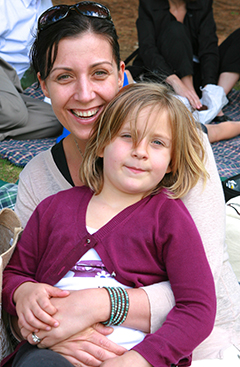By Julia Pettengill
Our daughter Sophie was diagnosed with leukemia at age 2½, and received two years of care at Dana-Farber/Boston Children’s Cancer and Blood Disorders Center. While I felt tremendous joy and relief when she completed treatment, I also found the experience traumatic.
After all, we had been in the safe world of our cancer center for half of Sophie’s life. Our time there was so intense that, when Sophie finished, I understood how veterans must feel when they come back from a war. I was exhausted and unsure of how to go forward.

Looking back, I realize it is very important to think about the end of treatment before the day actually comes. Here are some questions to ask your oncologist as your child approaches this milestone.
1. What can I expect from my child’s pediatrician?
Your child may have been in the care of an oncologist for as long as two years, and you’ll need guidance about transitioning back to your general pediatrician. Find out what role each doctor will play now. Which one do you call when your child has health issues? Will your oncologist send your pediatrician a treatment summary?
2. How often will child return for annual check-ups, and what survivorship care is recommended?
Find out if your cancer center offers follow-up care for survivors.
3. What psychosocial support is available to my family now?
You and your family may have had support from a social worker during your child’s experience. Can you still call on this person? Are there resources in the community for you?
4. Should I seek a neuropsychological evaluation?
Cancer treatment can affect your child’s cognitive, social, and emotional abilities. This evaluation tests these areas and compares your child’s scores with those of other children the same age. The evaluation is usually done through play, so your child will not feel “tested” in the traditional sense. For us, the test gave us a baseline to better advocate for our daughter and watch for any problems in the future.
5. Where can I find resources to manage long-term effects?
We received a Transition to Survivorship notebook to educate us about the possible long-term effects Sophie might experience. If your cancer center does not provide this, ask your oncologist to recommend online resources.
6. How can I stay connected?
Some families want to stay connected to the place that saved their child’s life. For example, I serve on the Patient Family Advisory Council to guide improvements for other families and participate in the Boston Marathon Jimmy Fund Walk. You might find other opportunities to volunteer.

This is a very thoughtful piece, and way beyond the thinking that was done in the 1970’s when I was treated for Hodgkin’s Disease at age 10 (surgery, radiation, chemo). There are certainly a few things that I think it would have been nice to have been able to consider sooner, such as the fact that the treatments caused me to be infertile, but the single-minded goal at the time was to cure me and I am grateful that worked! I was fortunate to have had annual check-ups for 25 years at the same hospital thereafter, after which they pretty much said enough already, you’re fine. Oh, and I do have a beautiful 7-year-old son, just not from my own sperm (and having discussed this openly with him since birth, neither he nor I is at all concerned about that). Good luck to all your little post-treatment survivors!
These questions are ones that could be applied to adult cancer survivors as well. In comparing notes with my friend who’s son had ALL and the experience I had caring for my husband with non-Hodgkin’s Lymphoma with CNS involvement, we discovered that the hospitals did a much better job at educating parents–both during and after the process. I’m glad your daughter is finished with her treatment and pray that she continues to have good health.